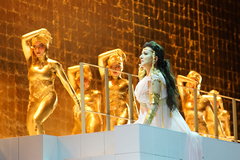| Opera Reviews | 25 April 2024 |
A powerful and visually rewarding eveningby Moore Parker |
|
| Strauss, R: Die Liebe der Danae Salzburg Festival 8 August 2016 |
|
|
Director Alvis Hermanis wonderfully mirrors the work’s interwoven thematic material in settings dominated by exotic oriental carpets and projections (video design by Ineta Sipunova) of “ornaments” as symbolic representations, concluding the action with simple weaving looms in Midas’ austere abode for Danae (centre-stage, and firmly abiding by the pattern she has chosen for her life’s path) and a dozen Burka-clad co-workers. In keeping with the diversity between the realms of the gods and the mortals, the colour white - in the form of a clinically tiled centrepiece, a life-sized elephant (upon which Jupiter makes his entrance), and a well-mannered white donkey (to accompany Midas and Danae) - contrasts with fabulously lavish costumes (Juozas Statkevičius) the colourful props, and the most splendid range of oversized turbans imaginable! The extensive breadth of Salzburg’s Festspielhaus is cleverly utilised through an enormous rectangular opening, which can be adjusted as required while providing both vertical and horizontal interest to compliment lower stage-level activity. An extensive line-up of balletteuses (choreographer, Alla Sigalova) plays an important stage-filling role and relief in potentially static moments - here somehow reminiscent in style of the fashion at the time the opera was first shown in this city, employing gold-leotarded girls in Esther Williams-like gyration (alas, here not quite maintaining the accuracy of their Hollywood counterparts). All this - underscored by superb lighting (Gleb Filshtinsky) - combine to form a powerful and visually rewarding evening. In the title role, Krassimira Stoyanova builds on last season’s Marschallin here in Salzburg with virgin repertoire to which she is even more suited. She describes Danae as the most difficult part in her current line-up, and paces herself with finesse and superb lyricism (while not eclipsing memories of Deborah Voigt’s majestic vocal rendering at the 2002 Festival here). Furthermore, Stoyanova brings an ideal poise and warmth to the character - making her final choice of the cursed and impoverished Midas over the claims of Jupiter’s realm fully credible. Tomasz Konieczny’s Jupiter is monumental (equally so in stage presence and vocal potency) - seemingly tireless and going from strength to strength as the arduous evening progresses, while greatly pointing his words and riding Strauss’ vast cantilene in grandeur. His closing monologue to Act 2 (“Treulose Danae!”) was arguably the vocal and dramatic highlight of this performance. The musicologist Ernst Krause once described Die Liebe der Danae as “a German bel canto opera in search of the land of the Greeks with its throat” - an adage whose framework is ideally emulated by both leads here. Midas, alias Chysopher, is fiendishly difficult (in keeping with the most testing of Strauss’ tenor challenges) and Gerhard Siegel’s valiant reading is deserving of greater acclaim than that received at the final curtain. He endures the part’s grueling tessitura while providing a formidable stage creation who in many respects truly deserves to win his spouse at the end of the show. Praise too to Regine Hangler’s Xanthe - an ideal foil in Act 1 to Stoyanova’s Danae, and also to Wolfgang Ablinger-Sperrhacke’s Pollux, who well compliments the cast. Norbert Ernst is an agile Merkur - possibly vocally just a touch under par on this particular evening - but as ever, impressive in his intensity and alacrity. All Four Queens (Mária Celeng, Semele; Olga Bezsmertna, Europa; Michaela Selinger, Alkmene; Jennifer Johnston, Leda) - with aptly and amply boosted bosoms and flamboyant gesture - charm with their intensely camp admiration of Jupiter, while harmonising vocally to perfection. Clever casting too in the Four (well-contrasted) Kings, taken here by Pavel Kolgatin, Andi Früh, Ryan Speedo Green, and Jongmin Park. In fine fettle, the Vienna Philharmonic Orchestra and Chorus - here under the baton of Franz Welser-Möst, who negotiates his path through the intricately complex score (for the original WW2 planned production, Clemens Krauss enjoyed no fewer than 47 orchestral rehearsals) with dexterity - generally maintaining fair pit-to-stage balance, but undeniably showing scope for further emotional profundity. All-in-all, a night to remember.
|
|
| Text ©
Moore Parker Photo © Salzburger Festspiele / Forster |

 Richard Strauss was no longer alive when Die Liebe der Danae received its world premiere at Salzburg’s 1952 Festival. He did however attend the dress rehearsal for a planned production here in August 1944 (an ill-fated festival which was cancelled by the Nazi regime following the 20 July attempt on Hitler’s life). Following that rehearsal, Strauss described this - his penultimate opera - as “my final affirmation of Greek culture and the conclusive union of German music with the Greek soul.”
Richard Strauss was no longer alive when Die Liebe der Danae received its world premiere at Salzburg’s 1952 Festival. He did however attend the dress rehearsal for a planned production here in August 1944 (an ill-fated festival which was cancelled by the Nazi regime following the 20 July attempt on Hitler’s life). Following that rehearsal, Strauss described this - his penultimate opera - as “my final affirmation of Greek culture and the conclusive union of German music with the Greek soul.”





